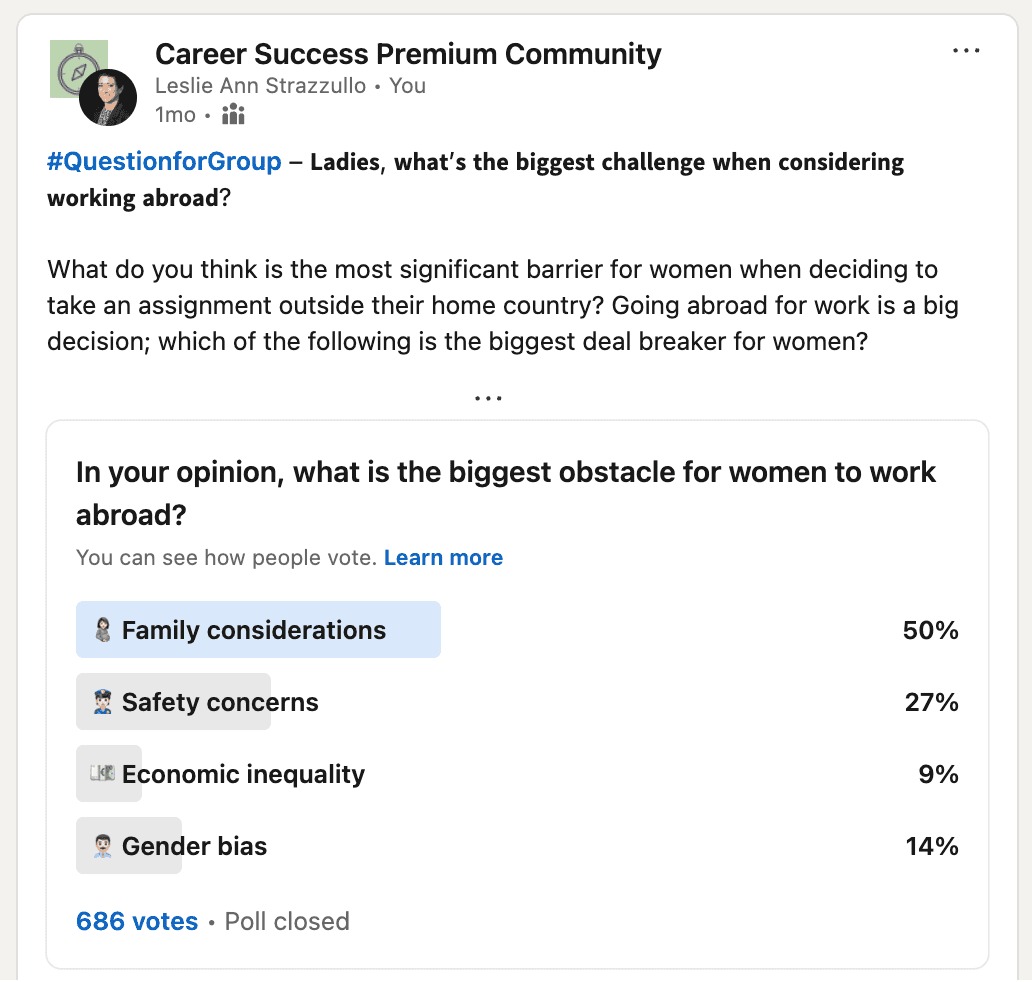Global Career Mobility Needs a Gender Rethink
Women face unique challenges. How the conversation must evolve — and why working abroad matters.
Interest in work abroad is trending upwards
The desire to work internationally is on the rise as seen in recent studies. A new global study conducted by Ipsos of over 10,500 workers across 19 countries reveals that nearly 50% of the professionals surveyed would consider relocating internationally for work — a notable increase from 46% in 2017.
Furthermore, HRO Today revealed that 44% of Gen Z believe that working remotely should not be confined to one’s home country. While Remote’s Workforce Report found that 55% of decision makers would hire the best candidate no matter where that person was located.
But despite the growing appetite for work across borders, gender disparities in international mobility persist.
Obstacles still exist for females considering relocating for work
The gender gap in international mobility shows little signs of improvement. A Mercer 2025 Talent Mobility Outlook survey of multinationals stated that 32% of respondents saw assignments taken up by females unchanged for 2025.
And even though recent findings provide encouraging news for business professionals wanting to work abroad, a poll I ran in LinkedIn’s Career Success Premium Community in June 2025 showed that a significant barrier continues to hold women back.

According to the 685-plus professional women who participated in the poll, 50% of respondents stated that family considerations (starting a family, childcare, elder care, or household management) are the biggest obstacles to working abroad.
It’s clear. This isn’t about ability, it’s about support. The good news is, though, we’re seeing signs of change.
Why does work abroad matter?
Global experience remains a powerful accelerator for leadership roles.
Yet, many women continue to be passed over for international assignments due to outdated assumptions or lack of exposure to international opportunities.
But here’s the truth: women who do take on global assignments are not only thriving — they’re also bringing new perspectives and inclusive leadership styles to their new teams. So, here’s what women can gain from going global.
Build critical skills for career growth
Aside from being a prerequisite for senior leadership roles in global companies, experience overseas will expand your network and introduce you to new opportunities and projects.
I had the opportunity to be part of an M&A transition team in Germany which opened the door to not only a new industry, but also a highly visible role of managing brand integration and marketing communications for a 100M-plus euro chemicals business.
Succeeding abroad helped me develop valuable skills such as adaptability, open-mindedness, and cross-cultural communications. Skills like these and resilience are highly valued in today’s remote, hybrid, and globalized companies.
Many women also leverage their expat experience to start new businesses or make strategic career pivots.
Feel empowered with new confidence
While starting over in a new country can be scary, women can achieve greater self-reliance while navigating new cultures, learning a new language, and integrating into a new work environment.
You certainly live a deeper sense of purpose and self-awareness when living and working abroad. For me, it became a personal mission to succeed in Milan and live a fulfilled life both personally and professionally.
Furthermore, women in global roles often challenge traditional gender norms, becoming role models and change agents within their organizations, leading to long-term collaborations and mentorship opportunities for up-and-coming talent.

Live and work with purpose
Expat life often encourages empowerment, reflection, and redirection.
The experiences and confidence I gained prompted me to pursue and obtain opportunities outside my comfort zone that aligned with my value system. This meant taking on new challenges and promotions as well as knowing when to walk away from a bad situation. My time overseas encouraged me to not go with the flow during difficult times but stand up for what was right.
Globally, work-life balance made its big debut post pandemic, but for me it was learned from day one in my life abroad. My Italian colleagues worked with as much passion and dedication as any other colleagues, but they also knew how to take advantage of their time off. I still encounter an unfortunate person or two who have missed the boat on how living a balanced life makes us more productive on the job.
Enjoy expat perks
Taking an expat assignment should be more than a salary bump. It can also be a lifestyle upgrade.
Smart women can negotiate for:
- Housing allowance, relocation reimbursement, and temporary accommodations
- Language and business training
- School stipends and family support
- Visa, work permit, IDs, tax and legal assistance
- Guaranteed re-entry plans and promotions upon return
Once abroad, you’ll sharpen your financial literacy and understanding of global markets as you begin to invest, negotiate, collaborate, and work in a new economic system with currency fluctuations, shifts in cost of living, and different spending habits.
I also appreciate benefits such as universal healthcare that don’t break the bank and rival the costly and privatized system back home.

What can HR do to improve the situation?
If women aren’t applying for international roles in your company, it’s time to assess your program.
- Audit your expat program to understand where unconscious bias exists. Survey women in your organization to get their perspective.
- Expand your DEI initiatives to include workforce mobility / expat opportunities.
- Understand what good looks like. Research expat-friendly companies to see if you are competitive. Does your program offer the right perks and mobility assistance? Flexibility should be central to any program. Incentives to consider include:
- short- and long-term assignments
- a salary increase or bonus
- a local sponsor and mobility agent to ensure a smooth transition
- support for work permits, visas, IDs, etc.
- temporary housing and relocation assistance
- financial and tax planning counseling
- professional and language training
- therapy support
- schooling for children
- periodic trips home
- a promotion on returning home
- Provide internal sponsorship, networking, and mentoring to share learnings and build a healthy pipeline for future female expats.
- Track ROI. Are you developing the future-ready talent for leadership? Collect feedback, evaluate, and improve your program.
Final thoughts
As we navigate the future of workforce mobility, we need to ensure that women are part of the equation. It’s time for companies to see women as a relocation asset and start recognizing them as candidates for global leadership. Not someday. Now.
Advertisement
LinkedIn poll methodology
I ran this poll in the Career Success Premium Community, a private network for Premium LinkedIn subscribers designed to help members advance in their careers, tackle professional challenges, and find new opportunities.
The poll was open for two weeks and ended on 6 June 2025.
The question:
In your opinion, what is the biggest obstacle for women to work abroad?
The answer choices:
- Family considerations
- Safety concerns
- Economic inequality
- Gender bias
A total of 686 group members voted. Family considerations were the biggest obstacle with 50%, followed by Safety concerns with 27%, Gender bias with 14%, and Economic inequality with 9%.
- Family considerations: starting a family or managing a household, childcare, or aging parent care
- Safety concerns: maintaining personal security, avoiding harassment, or traveling solo
- Economic inequality: facing wage gaps or difficulties securing leadership positions or being undervalued compared to male colleagues
- Gender bias: relocation to environments where gender norms might be more restrictive or challenging
Advertisement
About Leslie Strazzullo
After landing in Milan, Leslie Strazzullo decided to build a life in the country of her family roots — Italy. She is a marketing professional with over 20 years of experience working in Fortune 100 and global multinational companies abroad. She is passionate about cross-cultural collaboration and helping others kick-start their global careers.
Article topics
Related articles
Top 11 Countries for a Career Boost
Moving abroad for work can open up a world of opportunities. For many, it’s a chance to experience a new culture, improve their quality of life — and also advance their career. Here’s a look at 11 countries and territories where expats have found improved job prospects, along with the top sectors in each destination.
The Pros and Cons of a Career Abroad
Working abroad can be a great way to experience the world, but it also comes with its own unique challenges. From diversifying your income to navigating office politics in a second language, we look at the highs and lows you can expect from an expat career.
How to Turn Your Passion into a Career Abroad
Are you unsatisfied with your job or life in general? Turning your passion into a career abroad may be something to consider. But before you dive into the deep end, take some time to think about the most important things to factor in, and figure out where to begin your journey.
From a West Island to an East Island Girl!
For Khematee, moving to Japan was a smooth experience. Although luck was definitely on her side, there were some things that required some mental adjustment and resilience on her side. Read Khematee’s story on how she turned from a West island to an East island girl.
“This is not allowed!”
As a serial expat, InterNations member Monica has learned something from every country, she has lived in. Although the experience also came with a lot of challenges, she has found a way to create a sense of belonging and connection wherever she goes. Read on to learn more about her story!




